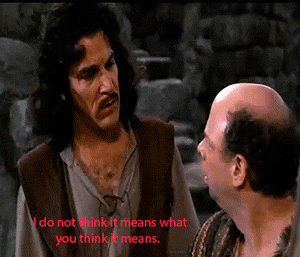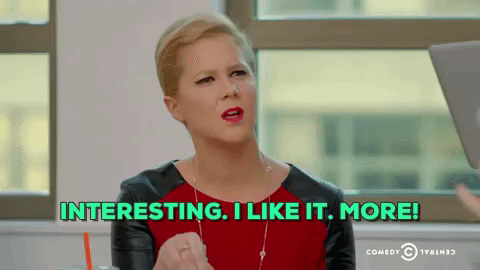US public schools have notoriously insufficient sexual education. Some countries are more advanced, but unfortunately many students still learn more from movies and porn than from a classroom setting. Most schools don't spend much time educating their students on the logistics of intercourse, sexuality, consent, or protection. This is a shame, because for most teens, sex already is or soon will become a big part of their lives. If you're a teen with more questions than answers about sex, check Seventeen.com's list of 13 things you don't learn in sex ed, but really should know.
Snapshot Survey
Thanks for sharing your thoughts!
Please subscribe for your personalized newsletter:
Successfully subscribed!
Thank you for subscribing! Check your inbox for personalized content.
1. It's Normal to Be Interested in Sex - or Not
 You're not weird if you're into it before your friends are - or if you literally could not care less about it. "You decide when you want to be sexually active," Dr. Simms-Cendan says. Not your partner. Not your crew. YOU.
You're not weird if you're into it before your friends are - or if you literally could not care less about it. "You decide when you want to be sexually active," Dr. Simms-Cendan says. Not your partner. Not your crew. YOU.
2. Sex Isn't Just…sex
 In other words, it's not just vaginal intercourse - sexual activity includes just about any kind of intimate contact. "That could be kissing on the lips; touching intimate parts of the body with the hands, mouth, or penis; or vaginal or anal penetration," says Sarah Yamaguchi, MD, an OB/GYN at Good Samaritan Hospital in Los Angeles, CA. So when your doctor asks about your sexual history, any of the above is fair game. And it's important to be honest, so she can tell you how to stay healthy and protect yourself.
In other words, it's not just vaginal intercourse - sexual activity includes just about any kind of intimate contact. "That could be kissing on the lips; touching intimate parts of the body with the hands, mouth, or penis; or vaginal or anal penetration," says Sarah Yamaguchi, MD, an OB/GYN at Good Samaritan Hospital in Los Angeles, CA. So when your doctor asks about your sexual history, any of the above is fair game. And it's important to be honest, so she can tell you how to stay healthy and protect yourself.
3. How You Define Virginity is Totally Your Call
 For some people, virginity has a cut-and-dry definition. For others, it's a flexible concept (and kind of a heteronormative term, tbh). Whatever rings true for you is fine. As far as your gyno is concerned, what you're doing is more important than how you label it. "We think of virginity as something that's really determined more by an individual girl herself and not by anybody else," Dr. Simms-Cendan says. "It's not a medical diagnosis."
For some people, virginity has a cut-and-dry definition. For others, it's a flexible concept (and kind of a heteronormative term, tbh). Whatever rings true for you is fine. As far as your gyno is concerned, what you're doing is more important than how you label it. "We think of virginity as something that's really determined more by an individual girl herself and not by anybody else," Dr. Simms-Cendan says. "It's not a medical diagnosis."
4. You Can Say No at Any Time
 It's never too late to change your mind. You're literally inches away from doing the deed? You've done "everything but"? You said you were ready, but you're having second thoughts? You've already done it, but don't want to do it again? You had sex with your last bf/gf, but want to hold off this time? Whatever your reason is, it's valid - and totally fine to say no. "It is never too late to change your mind," Dr. Yamaguchi says. "Consent can be given and withdrawn" at any point. If your partner is upset, then they are not the right person."
It's never too late to change your mind. You're literally inches away from doing the deed? You've done "everything but"? You said you were ready, but you're having second thoughts? You've already done it, but don't want to do it again? You had sex with your last bf/gf, but want to hold off this time? Whatever your reason is, it's valid - and totally fine to say no. "It is never too late to change your mind," Dr. Yamaguchi says. "Consent can be given and withdrawn" at any point. If your partner is upset, then they are not the right person."
If you're looking to engage your partner in intriguing conversations, why not try some hypothetical questions for couples? These fun queries will not only keep the conversation lively but also stimulate deep thoughts and potentially reveal insights about each other's personality and thought processes.
5. The Pill May Not Be the Best BC for You
 The Pill is 99% effective against pregnancy if you use it perfectly - but most people don't. Under normal circumstances, it's actually closer to 91 percent effective, which sounds solid until you do the math and realize, OMG, that means around 1 in 10 Pill users get preggo each year. If you're worried you won't remember to take it at the same time each day, Dr. Simms recommends asking your doctor about long-acting reversible contraceptives like birth control implants or the IUD instead. Just keep in mind that none of the above protect against sexually transmitted infections.
The Pill is 99% effective against pregnancy if you use it perfectly - but most people don't. Under normal circumstances, it's actually closer to 91 percent effective, which sounds solid until you do the math and realize, OMG, that means around 1 in 10 Pill users get preggo each year. If you're worried you won't remember to take it at the same time each day, Dr. Simms recommends asking your doctor about long-acting reversible contraceptives like birth control implants or the IUD instead. Just keep in mind that none of the above protect against sexually transmitted infections.
Gallery Spotlight
Save and share the images that inspire you. Tag @allwomenstalk to get featured.
Save
6. Condoms Aren't Foolproof
 Condoms can help protect you from sexually transmitted infections like HIV, gonorrhea, chlamydia, and high-risk HPV - but they're not fail-safe, and they don't protect against everything. "Condoms are not effective at preventing the transmission of herpes or warts, since those lesions can happen on an area not covered by the condom," Dr. Yamaguchi says. That's why STI testing is super-important if you're sexually active - yep, even if you're being careful.
Condoms can help protect you from sexually transmitted infections like HIV, gonorrhea, chlamydia, and high-risk HPV - but they're not fail-safe, and they don't protect against everything. "Condoms are not effective at preventing the transmission of herpes or warts, since those lesions can happen on an area not covered by the condom," Dr. Yamaguchi says. That's why STI testing is super-important if you're sexually active - yep, even if you're being careful.
7. In Many Cases, STI Testing Can Be Totally Confidential
 "Many STIs are treatable, but we need to know you have them," Dr. Simms-Cendan says. "If you don't know you have them, they can cause long-term problems." Check your state's confidentiality laws - as long as you're over 13, you may be able to get tested without your doctor alerting your parents.
"Many STIs are treatable, but we need to know you have them," Dr. Simms-Cendan says. "If you don't know you have them, they can cause long-term problems." Check your state's confidentiality laws - as long as you're over 13, you may be able to get tested without your doctor alerting your parents.
8. Your Doctor Should Never Judge You. Period
 "My patients all think they're going to ask me something 'shocking' that I've never heard before, but I rarely hear a question that hasn't come up before," Dr. Yamaguchi says. "We talk about vaginas and look at them all day. It may be an embarrassing area for you to discuss, but not for us." You should feel comfortable asking your gyno literally anything. If you get an unapproachable vibe from her, or she shades you for asking about your sexual health, it's time to find a new doc.
"My patients all think they're going to ask me something 'shocking' that I've never heard before, but I rarely hear a question that hasn't come up before," Dr. Yamaguchi says. "We talk about vaginas and look at them all day. It may be an embarrassing area for you to discuss, but not for us." You should feel comfortable asking your gyno literally anything. If you get an unapproachable vibe from her, or she shades you for asking about your sexual health, it's time to find a new doc.
9. Masturbation is No Biggie
 It's not wrong, it's not weird and it's not just for boys. "It's okay to masturbate!" Dr. Simms-Cendan says. "Just because you're interested in sex, it doesn't mean you have to have sex with somebody. You can make yourself happy. Masturbation never got anybody pregnant, never gave anyone an infection, and never dealt with relationship drama."
It's not wrong, it's not weird and it's not just for boys. "It's okay to masturbate!" Dr. Simms-Cendan says. "Just because you're interested in sex, it doesn't mean you have to have sex with somebody. You can make yourself happy. Masturbation never got anybody pregnant, never gave anyone an infection, and never dealt with relationship drama."
10. Sex Should Be Enjoyable
 If you are sexually active, it should be something you're doing for you, not just to make your partner happy. And while it's totally okay if you don't have an orgasm - it can take awhile to figure out what works for you - it should at least be something you look forward to. "If you're dreading it, don't do it," Dr. Simms-Cendan says. "And if it's painful, talk to a doctor."
If you are sexually active, it should be something you're doing for you, not just to make your partner happy. And while it's totally okay if you don't have an orgasm - it can take awhile to figure out what works for you - it should at least be something you look forward to. "If you're dreading it, don't do it," Dr. Simms-Cendan says. "And if it's painful, talk to a doctor."
11. Your Vagina Doesn't Look Weird
 We've said this before, but you can seriously stop stressing about what your vag looks like. "Everybody's so different down there," Dr. Simms-Cendan says. "It's a wide variety. And you're normal."
We've said this before, but you can seriously stop stressing about what your vag looks like. "Everybody's so different down there," Dr. Simms-Cendan says. "It's a wide variety. And you're normal."
12. Porn Isn't Sex Ed
 Internet porn may seem like an easy way to get a lot of questions answered at once - sort of like a super-NSFW video tutorial - but it's not exactly known for being realistic. "Porn is as accurate about sex education as action movies are accurate about the real world," Dr. Yamaguchi says. Still, the internet can be a helpful resource for questions you're too embarrassed to ask anyone else, as long as you stick to reputable sites like Planned Parenthood or Bedsider. Or just talk to your gyno - did we mention she's really, really not judging?
Internet porn may seem like an easy way to get a lot of questions answered at once - sort of like a super-NSFW video tutorial - but it's not exactly known for being realistic. "Porn is as accurate about sex education as action movies are accurate about the real world," Dr. Yamaguchi says. Still, the internet can be a helpful resource for questions you're too embarrassed to ask anyone else, as long as you stick to reputable sites like Planned Parenthood or Bedsider. Or just talk to your gyno - did we mention she's really, really not judging?
13. Sex Ed Should Be Inclusive
 Even if your school has a sex ed program, it's likely geared towards straight, cisgender teens - and if that's not how you identify, you may feel like you're not getting the info you need. If that's the case, it can be super-helpful to find an LGBTQ-friendly doc who can answer any questions you still have. "The bottom line is, go to a gynecologist you're comfortable with," Dr. Simms-Cendan says. If your doc seems clueless about LGBTQ+ issues, look for a new one.
Even if your school has a sex ed program, it's likely geared towards straight, cisgender teens - and if that's not how you identify, you may feel like you're not getting the info you need. If that's the case, it can be super-helpful to find an LGBTQ-friendly doc who can answer any questions you still have. "The bottom line is, go to a gynecologist you're comfortable with," Dr. Simms-Cendan says. If your doc seems clueless about LGBTQ+ issues, look for a new one.
This is what sex ed should have taught you, but how many of these have you actually heard from a teacher? What other sex advice have you received?
Snapshot Survey
Thanks for sharing your thoughts!
Please subscribe for your personalized newsletter:
Successfully subscribed!
Thank you for subscribing! Check your inbox for personalized content.
Comments

EST 2005
Evolve. Empower. Elevate.
- Creators on the platform
- 3,000+
- Total social reach
- 12M+
- Features published
- 100K+
Create your profile. Earn badges. Level up your reading.
Join Allwomenstalk to track your streaks, collect badges, and earn XP for the things you already do—reading, sharing, and taking quizzes.
- 🔥Daily streaks with gentle boosts for 3, 7, and 30 days.
- 🏅Collect badges like Reader I–III, Socialite, and Quiz Ace.
- ⚡️Earn XP for reads, deep reads, likes, comments, and shares.
It’s free. Takes 30 seconds. Already have an account? Sign in.



